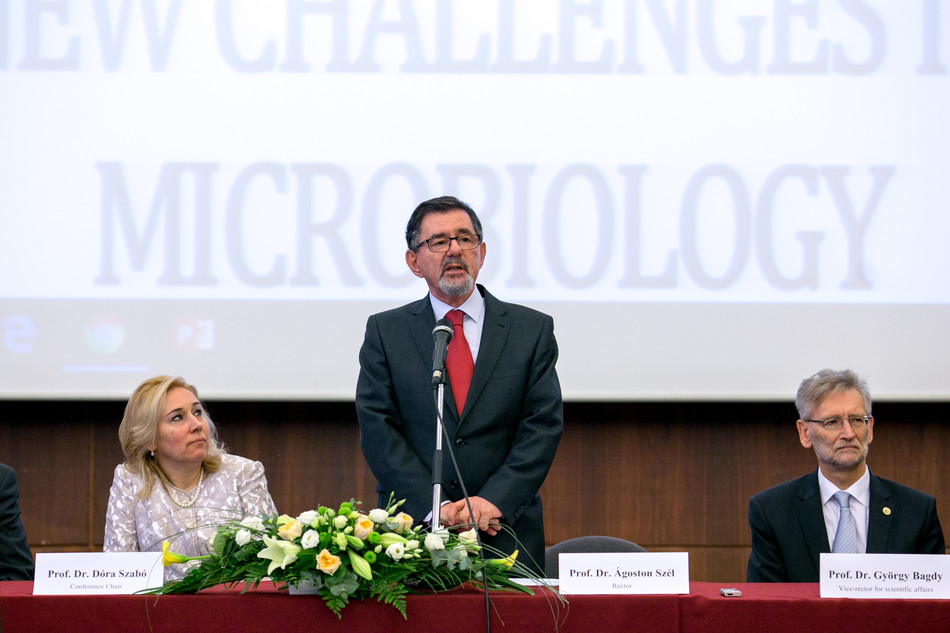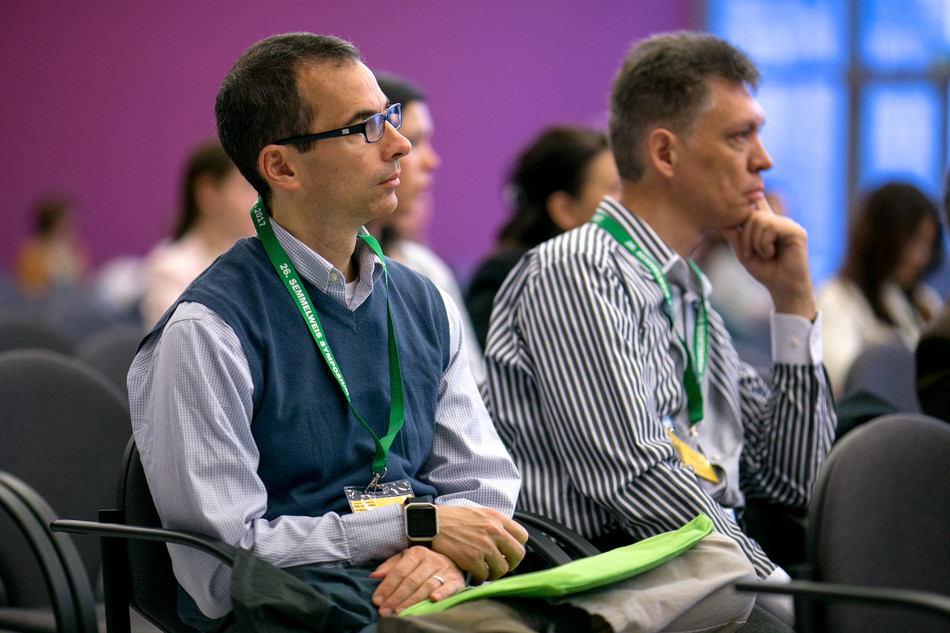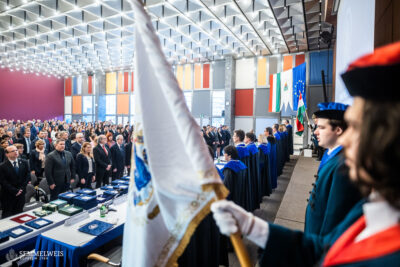This year’s Semmelweis Symposium titled “New challenges in microbiology” was hosted by the Department of Medical Microbiology in the Nagyvárad tér Theoretical Building on 9th and 10th November 2017. Over 250 participants attended the event organised for the 26th time, including 10 international speakers from Europe and the United States.
 In his opening speech Dr. Ágoston Szél, Rector reminded the audience of the importance of Semmelweis Symposium, which is one of the most prestigious scientific events of the university involving international participants.
In his opening speech Dr. Ágoston Szél, Rector reminded the audience of the importance of Semmelweis Symposium, which is one of the most prestigious scientific events of the university involving international participants.
“The departments willing to organize the symposium need to enter a competition and the strict selection process warrants that participants will be able to attend programmes of the highest quality. Next year is the 200th anniversary of the birth of Ignác Semmelweis, who himself can be considered as the most famous microbiologist making his discovery in an era when the existence of microbes was still unknown.”, Dr. Ágoston Szél said.
Dr. György Bagdy, Vice-Rector for Scientific Affairs is a pharmacologist, who also has to face the challenges of microbiology during his work.
“I have encountered resistance, complex combination therapy and the opportunities that the new anti-viral and anti-bacterial substances provide. The symposium will provide an insight into the results of the latest research, such as that of focusing on the microbiome.”, Dr. György Bagdy said.
The first presentation was held by Dr. Dóra Szabó, Director of the Department of Medical Microbiology, who talked about the history of the department.
 “Microbiology as a subject at the university was introduced by Dr. Endre Hőgyes in 1883. He was the one who founded the first Pasteur Institution in Hungary and introduced vaccination against rabies. The Department became independent and held its first scientific conference in 1948.”, Dr. Dóra Szabó said.
“Microbiology as a subject at the university was introduced by Dr. Endre Hőgyes in 1883. He was the one who founded the first Pasteur Institution in Hungary and introduced vaccination against rabies. The Department became independent and held its first scientific conference in 1948.”, Dr. Dóra Szabó said.
One of the distinguished guests at the event was Dr. István Nász, emeritus, founder of the Hungarian Society for Microbiology, researcher of the adenoviridae for 50 years, one of the founders of the Department of Medical Microbiology and its member for nearly 70 years.
The two-day-long symposium gave an overview of the latest research results through the introduction of ongoing research, the work of research groups at the Department and international joint projects. One of the current hot topics of microbiology is the development and spread of antibiotic resistance. The Department has a research group studying Gram-positive and Gram-negative bacteria and besides takes part in an international cooperation developing new peptide-type antimicrobial substances that offer therapeutic opportunities against multidrug resistant bacteria. The research involves German and American partners, who are responsible for synthesizing the new substances and their testing is carried out at the Department of Medical Microbiology.
Some of the topics covered viral infections linked to climate change, viral infections of transplant patients (human herpesvirus, CMV infection) and the latest findings regarding Hepatitis C and HIV viruses.
 A current hot topic is the research on the human microbiome, in other words, the role and importance of normal intestinal flora in case of pathological conditions, as it tends to change with the prevalence of more and more diseases (eg. diseases of the central nervous system, allergic diseases, obesity, diabetes). A research group at the Department has recently been set up to conduct research in this topic.
A current hot topic is the research on the human microbiome, in other words, the role and importance of normal intestinal flora in case of pathological conditions, as it tends to change with the prevalence of more and more diseases (eg. diseases of the central nervous system, allergic diseases, obesity, diabetes). A research group at the Department has recently been set up to conduct research in this topic.
The event’s 30 presentations were divided into 4 sections and included those of 10 international speakers coming from renowned institutions such as the Institut Pasteur in Paris and the Karolinska Institute in Stockholm.
The members of the event’s scientific committee were Dr. Dóra Szabó, director, Dr. Béla Kocsis, senior lecturer, Dr. Eszter Ostorházi, Dr. Orsolya Dobay, Dr. József Ongrádi, associate professors, Dr. Károly Nagy, professor, former director of the Department and Valéria Kövesdi laboratory assistant.
Pálma Dobozi
Photo: Attila Kovács – Semmelweis University
Translation: Ágnes Raubinek


